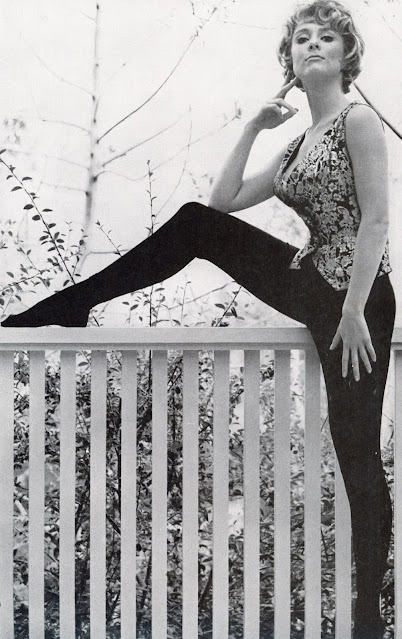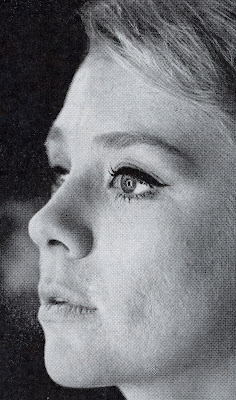In early 1964, Richard Warren Lewis wrote a two-page feature on Inger that primarily focused on the challenges Inger had faced in her life up to that point.
On her family:
I witnessed an awful lot of fighting in my family. I got used to keeping things to myself and never really saying what was on my mind. I was always afraid of hurting somebody.
On her 1955 marriage to agent Anthony Soglio:
[The wedding day] was the worst day of my life. I wanted to be anyplace but where I was. I married him for a lot of the wrong reasons. I had been dating him for about eight months, and he was the only person I knew in New York. For me the whole marriage proved pretty much of a nightmare. The experience made a lasting impression on me. I still have a fear of marriage.
On her 1959 suicide attempt:
It was such a relief. At that moment I thought it was the most rational thing I'd ever done in my life. For a long time I had nobody to talk to, including the man I had been with. When I began trusting the analyst, everything came out too fast. I felt lonely and sorry for myself. I felt like I didn't quite belong in the film world, that I wasn't good enough. I was constantly getting depressed. I had made a complete mess of my emotional life by trying to be very giving to a man because I was hoping he would do the same to me. I was just screaming out for somebody to love me. I kept searching for some kind of peace and tranquility. The more I searched for it, the more holocaust there was around me. It kept getting worse. [At a New Year's Eve party] Everyone was drinking, and it became more and more depressing. Everything seemed so distorted. I felt I was on the outside looking in. All of a sudden there was only emptiness. I needed someone to talk to, but there was no one left. Then everything exploded.
On her personality:
Once I felt that I was one person at home, and the minute I stepped out the door I had to be somebody else. I had a terrible insecurity, an extreme shyness, that I covered up with coldness. Everybody thought I was a snob. I was really just plain scared...I always used to jump into friendships and give too much. You can't do that. You end up like Grand Central Station with people just coming and going. And there you are, left behind...Sometimes I wonder if being an actress is really going to be enough for me. When you're sixteen, being in show business is a very romantic notion. You dream about your pictures all over the magazines. But what you think at sixteen and what you think at twenty-nine are two different things. If I took a test, I would probably find I'm in the wrong field.
In his biography of Inger, Patterson wrote that Inger, upon learning a new word, would write the word and its definition on an index card. On the back, she would use it in a sentence. On an index card for the word 'indomitable', Inger wrote:
Inger is indomitable because of her courage and her pride.
The Oxford English Dictionary (personal sidenote: Hi, Chuck!) defines 'indomitable' as:
1. That cannot be tamed; untameable.
2. Of persons, etc.: That cannot be overcome or subdued by labour, difficulties, or opposition; unyielding; stubbornly persistent or resolute.
From her earliest days in America, attempts were made to tame Inger. A father and stepmother, both possessing more force than love, started the trend of Inger's life. That disapproving look Inger saw in her father's eyes quickly transferred to the eyes of her first husband who, too, wanted her to bend to his rule. Then came studio executives whose attempts to silence a stubbornly vocal Inger—and her independent views on Hollywood—continued for the rest of her life. In spite of this resistance—not to mention the lovers who let her down along the way—Inger took a firm stance. She remained that wonderfully unique girl named Inger Stensland.
Just two weeks before her 1959 suicide attempt, Inger told a reporter, "I just don't want to be a second anybody, only myself." At that time, another reporter in Allentown, Pennsylvania had the pleasure of meeting with Inger and wrote:
Young and pretty, and undoubtedly talented, Miss Stevens has a lot more and that is an innate intelligence that makes her a very interesting conversationalist. There was none of the vapid, trite remarks—inspired by the press agent—which so frequently provide so small a gamut of conversation with actresses and actors. Miss Stevens has very definite ideas on many things and is most convincing, too.
In a 1963 article "Inger Stevens' Dim View of Stardom and Gold," Inger criticized stars saying they "do everything for the mythical career." She elaborated:
Some people sacrifice everything to get on top of the heap. They sacrifice friendship, their own individuality, and become a slave to a career...Why kill yourself and your identity reaching for something that's not there? It's not going to make you more accepted.
As the 1960's progressed, Hollywood higher-ups maintained their efforts to keep the unyielding Inger down and columnists relentlessly pursued her in an attempt to expose a life she intended to keep private. Still, Inger, through her intelligence and generosity, made large contributions to society throughout her life and continues to impact us today. I cannot think of a person more worthy of being called indomitable.
Sources:
Finnigan, Joseph. "Inger Stevens' Dim View of Stardom and Gold." Press and Sun-Bulletin. November 24, 1963.
"Indomitable." The Oxford English Dictionary. Second Edition. Clarendon Press, 1989.
Kohl, John Y. "The Curtain Rises." The Morning Call. December 21, 1958.
Lewis, Richard Warren. "TV's Farmer's Daughter has battled death, fickle suitors, and self-doubts." Saturday Evening Post. January 4-11, 1964.
Mendlowitz, Leonard. "Wants to Be Self." Pittsburgh Sun-Telegraph. December 16, 1958.
Patterson, William. The Farmer's Daughter Remembered. 2000.



No comments:
Post a Comment